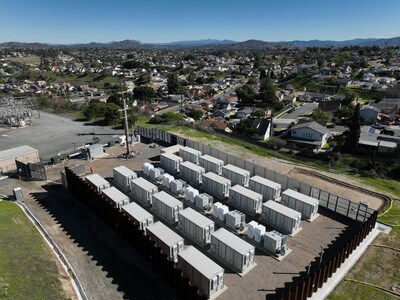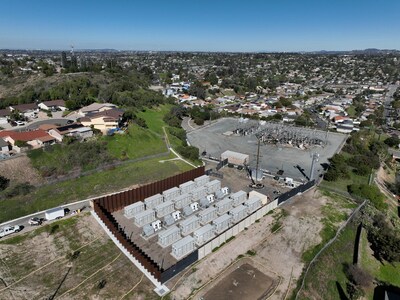SDG&E UNVEILS FOUR ADVANCED MICROGRIDS TO BOOST GRID RESILIENCE AND RELIABILITY
Video of
The four microgrid and energy storage sites, located in the communities of Clairemont, Tierra Santa, Paradise, and Boulevard, will help address surging energy demands in the
The ability to remotely operate microgrids offers real-time monitoring, faster response to grid events, more efficient energy storage management, and enhanced grid resilience designed to help, optimize overall performance, reliability, and sustainability. These systems utilize lithium iron phosphate (LFP) battery cells and have advanced safety and fire prevention features.
Caroline Winn, SDG&E's Chief Executive Officer, emphasized the significance of these clean energy projects in bolstering the region's resilience to the escalating challenges posed by climate change.
"Storage and microgrids are key to helping build a more resilient electric grid that can extend the availability of cleaner energy and help our communities better manage through grid emergencies like the extreme heat experienced in recent summers," said Winn. "These microgrids will actively dispatch clean energy to the grid when needed and help improve energy resiliency for critical facilities like fire stations, schools, and cooling centers in
Nora Vargas,
"For communities like mine that often experience outages during power emergencies, we welcome infrastructure that will help keep our lights on and our refrigerators running during difficult times," said Chairwoman Nora Vargas. "Enhancing our power grid is an important first step in making sure all communities have access to basic resources during a crisis, especially for our local schools, fire stations, and medical centers."
In December 2021, the California Public Utilities Commission granted the green light to SDG&E to move forward with these innovative projects. The four microgrids will operate independently or in tandem with the larger regional grid and offer a combined storage capacity of approximately 39 megawatts (MW) and 180 megawatt-hours (MWh) across four SDG&E substations.
These projects were set into motion in response to Gov. Newsom's State Emergency Proclamation in the summer of 2021. These facilities will be connected to the state energy market, allowing the California Independent System Operator (CAISO) to dispatch these resources as needed to help maintain a balanced supply and demand of energy throughout the state.
The energy storage sites are:
- The Clairemont microgrid serves the Balboa Branch Library/Cool Zone, Fire Station 36, and local schools such as Lafayette Elementary, Sequoia Elementary, Innovation and CPMA Middle Schools and Madison High School.
- The Elliott Microgrid will generate 10MW and has the capacity to power Fire Station 39, the Tierrasanta Public Library/Cool Zone, Tierrasanta Medical Center, Jean Farb Middle School, Canyon Hills High School, and Tierrasanta and Kumeyaay Elementary Schools.
- The Paradise Microgrid that has the ability to power Fire Stations 51 and 32, the Southeast Division Police Department, and Bell Middle School as well as Freese, Boone and
Fulton Elementary - The Boulevard microgrid serves the
San Diego County Sheriff's Department, Fire Station 47, Campo Reservation Fire Station, Cal Fire White Star Station, Campo Tribal Office, Campo Kumeyaay Nation Medical Center, Southern Indian Health Council Campo Clinic, the Boulevard Border Patrol Station, and the Boulevard Post Office
About SDG&E:
SDG&E is an innovative energy delivery company that provides increasingly cleaner, safe and reliable energy to better the lives of the people it serves in
![]() View original content to download multimedia:https://www.prnewswire.com/news-releases/sdge-unveils-four-advanced-microgrids-to-boost-grid-resilience-and-reliability-302061152.html
View original content to download multimedia:https://www.prnewswire.com/news-releases/sdge-unveils-four-advanced-microgrids-to-boost-grid-resilience-and-reliability-302061152.html
SOURCE San Diego Gas & Electric (SDG&E)









